| |
|
|
|
|
|
|
|
|
|
|
| |
| |
 |
|
| |
田润德 编译文/图 2020-08-25
19:36 |
|
| |
|
|
|
|
| |
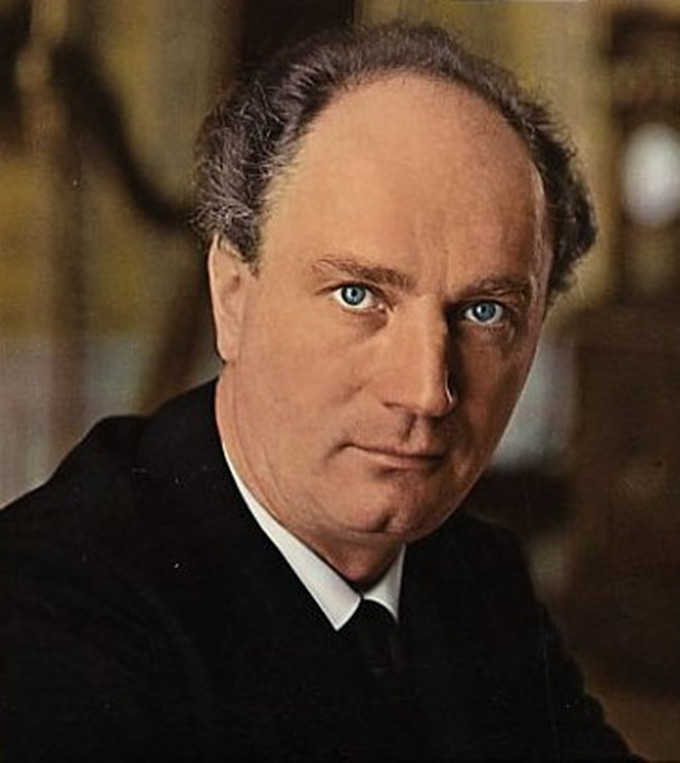 |
|
|
|
| |
拉斐尔·库贝利克(Rafael Kubelik,1941 —1996) |
|
|
|
| |
; |
|
|
|
| |
[中字]【纪录片】
拉斐尔·库贝利克:肖像 】
|
|
|
|
| |
|
|
|
|
| |
音乐历史上的今天
1961年8月25日,拉斐尔·库贝利克:《纪念吾妻的安魂曲》首演于卢塞恩。
拉斐尔·库贝利克(Rafael
Kubelik)生于捷克比霍里,其父扬·库贝利克(Jan kubelík)是著名小提琴家、作曲家。1928-1933年就学于布拉格音乐学院,次年即指挥捷克爱乐乐团首次登台。此后至1936年他经常指挥乐团为父亲演出其六首小提琴协奏曲的其他小提琴和乐队曲伴奏1936-1939年任捷克爱乐乐团执行指挥,1942年升任艺术总监。1948年捷共接管政权时,库贝利克正在英国参加爱丁堡音乐节,由此脱离捷克,次年赴美国指挥芝加哥交响乐团。1955年就任柯文特花园歌剧院音乐监督,1957-1958年指挥纽约爱乐乐团。1961-1979年间出任巴伐利亚广播交响乐团首席指挥。
拉斐尔·库贝利克于1914年出生在捷克的皮霍里。他的家庭是一个典型的音乐世家,父亲扬·库贝利克曾是19世纪末到20世纪初的世界著名小提琴家,在当时是著名的塞夫契克小提琴学派的代表人物。拉·库贝利克出生在这样优越的家庭音乐环境中,确实获得了许多使他终身受益的因素。他从14岁开始进入布拉格音乐学院中学习钢琴、小提琴、指挥和作曲。19岁从音乐学院毕业以后,便于第二年与捷克爱乐乐团合作进行了首次登台指挥。在其后的两年多的时间里,他多次随父亲外出旅行演出,并指挥乐队为他的父亲伴奏。
1936年,22岁的库贝利克担任了著名的捷克爱乐乐团的指挥,正式开始了他一生繁忙的指挥艺术生涯。在这个举世闻名的大乐团中工作了三年以后,库贝利克接到了布尔诺民族歌剧院的聘书,并于1939年至1941年担任了这家歌剧院的常任指挥。
1941年以后,库贝利克重返捷克爱乐乐团,与上次不同的是,这回他已是这个乐团的首席指挥了。库贝利克在这个乐团中整整工作了七年,为这个历史悠久,又具有着光荣传统的乐团的继续发展,起到了十分重要的作用。
1948年,库贝利克辞别了祖国,来到了大洋彼岸的美国。在美国,库贝利克进行了广泛的活动,力图在这里显露出他的指挥才华,1950年,他终于如愿以偿,上任担任了三年美国芝加哥交响乐团的常任指挥。然而就在他在美国展开他的活动范围之后,英国著名的皇家科文特花园歌剧院又向他频频地招手了,这使得他于1955年重又回到了欧洲,担任了这家在世界上与斯卡拉歌剧院齐名的大歌剧院的常任指挥,在这段时期里,库贝利克指挥该院演出了大量的歌剧作品,其中还包括许多具有纪念性意义的演出,比如他曾指挥该院在英国首演了雅那切克的歌剧《耶努法》和柏辽兹的歌剧《特洛伊人》,而这些重要的活动经历,都使得他逐步获得了越来越广泛的世界声誉。
1961年,库贝利克又来到了德国,在这里,他担任了另一个著名乐团—慕尼黑巴伐利亚广播交响乐团的常任指挥,他在担任这个乐团的常任指挥期间,曾多次率领该团出国访问演出,为这个乐团赢得广泛的世界影响,起到了不可低估的作用。到了20
世纪的70年代,库贝利克又开始重返美国,他在1971年到1974年间担任了纽约大都会歌剧院的常任指挥,他在就职以后,力尽艰辛,克服了重重的困难,终于使这个剧院恢复到了正常的轨道上来。
1974年,库贝利克辞去了大都会歌剧院音乐指导和常任指挥的职务,来到了位于中欧的瑞士,并最终加入了瑞士国籍。此后,库贝利克又以捷克—瑞士双重指挥家的身分,继续活跃在国际音乐舞台上。
今日视频:1、拉斐尔·库贝利克:肖像
;2、拉斐尔·库贝利克指挥马勒第五交响曲;3、
杨·库贝利克和拉斐尔·库贝利克父子共同演绎帕格尼尼《钟》(帕格尼尼第二小提琴协奏曲第三乐章,1935卡内基大厅录音) ——莫扎特之旅 |
|
|
|
| |
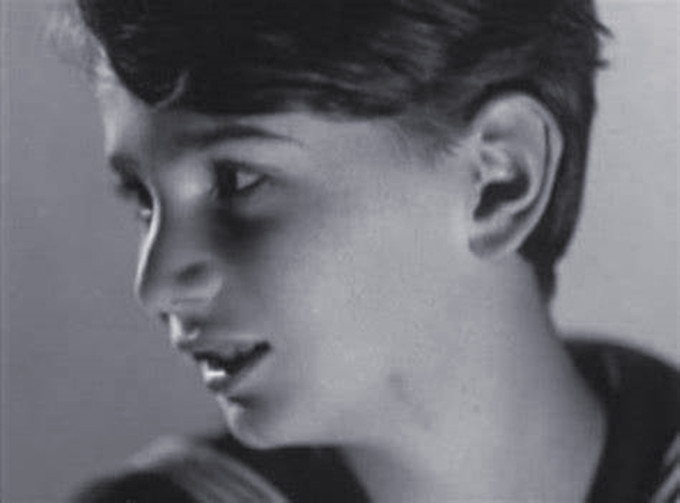 |
|
|
|
| |
年轻的拉斐尔·库贝利克(Rafael Kubelik) |
|
|
|
| |
Today in
the history of music
On August 25, 1961, Kubellick: requiem in Memory of my Wife
premiered in Lucerne.
Rafael Kubelik was born in Bihori, Czech Republic, the son of
Jan Kubelik, a renowned violinist and composer.He studied at the
Prague Conservatory of Music from 1928 to 1933, conducting the
Czech Philharmonic Orchestra for the first time the following
year.From then until 1936, he often conducted the orchestra for
his father to perform six violin concertos for other violins and
the accompaniment of the orchestra music. From 1936 to 1939, he
was the executive director of the Czech Philharmonic Orchestra.
In 1942, he was promoted to artistic director.When the
Communists took over in 1948, Kubelic was attending the
Edinburgh Music Festival in England and broke away from the
Czech Republic to conduct the Chicago Symphony Orchestra in the
United States the following year.He became music superintendent
of the Covent Garden Opera House in 1955 and conducted the New
York Philharmonic orchestra from 1957 to 1958.From 1961 to 1979,
he was chief conductor of the Bavarian Radio Symphony Orchestra.
Raphael Kubelic was born in Pikhoi, Czech Republic in 1914.His
family was a typical musical family. His father, Jan Kubelic,
was a world-famous violinist in the late 19th and early 20th
centuries and was a representative of the famous Sevcik violin
school at that time.Born into such a privileged family music
environment, La Kubellick certainly gained many factors that
benefited him throughout his life.He began studying piano,
violin, conducting and composition at the Prague Conservatory of
Music at the age of 14.After graduating from the conservatory at
the age of 19, he made his debut conducting with the Czech
Philharmonic Orchestra the following year.Over the next two
years, he traveled with his father many times and played in
orchestras for his father.In 1936, at the age of 22, Kubelic
began his busy conducting career as conductor of the famous
Czech Philharmonic orchestra.After three years in the
world-famous orchestra, Kubelic received an offer from the Opera
house of The Ethnolpe brno and became its permanent conductor
from 1939 to 1941.When kubelic returned to the Czech
Philharmonic after 1941, he was now the orchestra's chief
conductor.Kubellick worked with the orchestra for seven years
and played an important role in the continued development of a
group with a long history and a proud tradition.In 1948,
Kubellick said goodbye to his homeland and moved across the pond
to the United States.In the United States, Kubellick undertook a
wide range of activities in an effort to demonstrate his talent
as a conductor, and in 1950 he finally succeeded, taking up the
post of permanent conductor of the Chicago Symphony Orchestra
for three years.However, after he began his campaign in the
United States range, a well-known British royal families, covent
garden opera house was waved to him frequently to again, which
made him again returned to Europe in 1955, for the big and opera
in the world famous opera house permanent command, in this
period, the library bailey g command it to perform an opera a
lot of work, which also includes many performance of monumental
significance, such as he had command of the premiere in Britain,
the chuck's opera "Mr Law and Berlioz's opera" Trojan ", and
these important activity experiences,Gradually, he gained more
and more worldwide fame.Library and bailey came to Germany in
1961 and, here, he served as another famous orchestra in Munich
Bavarian radio symphony orchestra permanent command, when he was
during the permanent conductor of the orchestra, has repeatedly
led the delegation to visit abroad, won widespread influence in
the world, and for the orchestra played a role cannot be
underestimated.In the 1970s, Kubelick began to return to the
United States. He served as permanent conductor of the
Metropolitan Opera House in New York from 1971 to 1974. After
taking office, he worked hard and overcame many difficulties to
bring the theater back to the normal track.In 1974, Kubelic left
his post as musical director and permanent conductor at the
Metropolitan Opera to move to Switzerland in central Europe,
where he eventually became a Swiss citizen.Since then, Kubelic
continued to be active on the international music stage as a
Czech - Swiss double conductor.
Video of the Day: 1. Raphael Kubelik: Portrait;
2. Raphael Kubelik conducts Mahler's Fifth Symphony; 3. Father
and son Jan Kubelik and Rafael Kubelik perform Paganini's "Bell"
(Third movement of Paganini's Second Violin Concerto, 1935
Carnegie Hall Recording).
|
|
|
|
| |
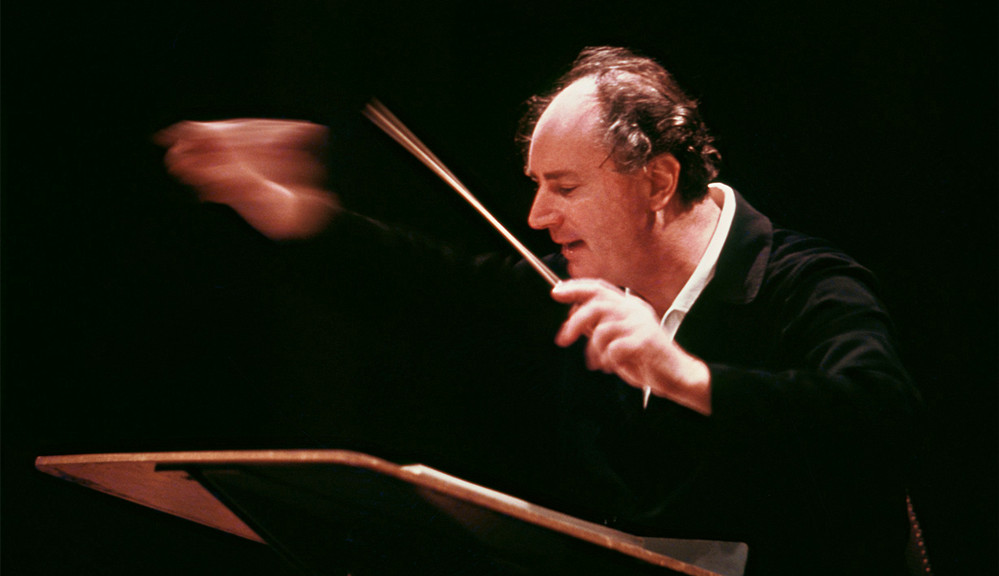 |
|
| |
拉斐尔·库贝利克(Rafael Kubelik)的指挥英姿 |
|
|
|
| |
拉斐尔·库贝利克的成就及荣誉 |
|
|
|
| |
热衷指挥事业
库贝利克的名字对于专业音乐工作者和音乐爱好者来说应该是并不陌生的,他是20
世纪中非常活跃和有影响力的著名指挥家。除了以上提到的那么多一流乐团的音乐指导与常任指挥以外,他还是一位异常繁忙的世界性客席指挥,在他的指挥生涯中,曾经担任过包括欧美各国和世界上其它国家和地区的交响乐团的客席指挥,足迹遍布之广是使很多人都望尘莫及的,因此有的资料上曾说他在客串指挥方面是仅次于卡拉扬的第二号人物,这种说法准确与否我们先另当别论,但他是20
世纪中最繁忙的客席指挥之一,则是肯定无疑的了。
库贝利克是老一辈指挥家中精力充沛式的人物。他那高雅的艺术趣味和极有吸引力的气质,一直是被后代的青年指挥家们奉为榜样的,而在专业素质上,他也是有着十分突出的特点的人物。他有着高度的艺术鉴赏力、敏锐的音乐感受力以及清晰明快、自然稳健的风格和特点,人们在聆听他指挥演奏的作品时,以上的特征便会随着音乐的进行而极其自然流畅地表现出来。
家庭背景
人们都说库贝利克是一位艺术修养既高雅又全面的艺术家,而这些不平凡的气质首先要归功于他那音乐世家家庭中的优雅的音乐环境的直接熏陶和影响,库贝利克的家庭是捷克有名的音乐世家,这个家庭曾经诞生过捷克历史上重要的音乐家,如果翻开捷克音乐史仔细观察的话,在那记载着斯美塔那、德沃夏克、雅那切克和苏克、塞夫契克等音乐大师的史册上,同样也端庄地记载着扬·库贝利克和拉·库贝利克的名字。他们父子二人,早已成为捷克音乐界中的重要人物而受到人们的尊敬和爱戴了。 |
|
|
|
| |
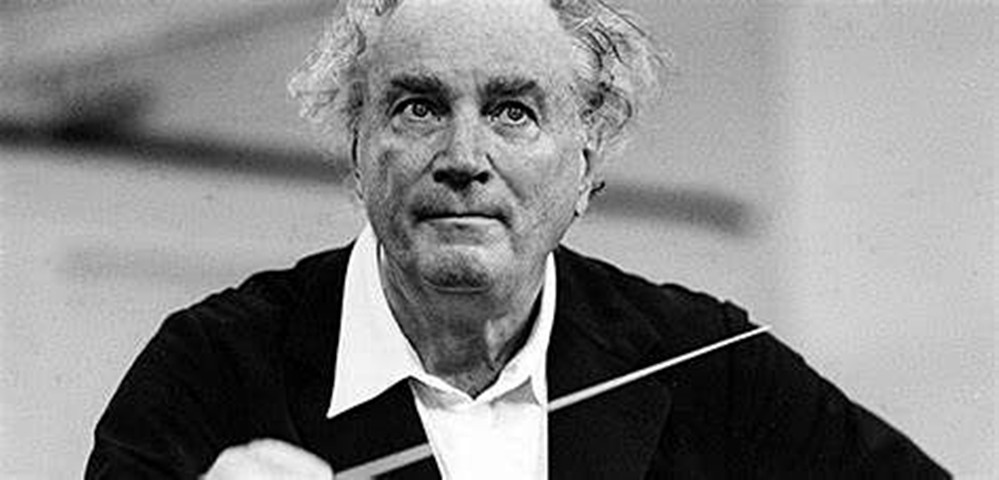 |
|
| |
拉斐尔·库贝利克(Rafael Kubelik) |
|
|
|
| |
指挥、作曲双料大师 |
|
|
|
| |
大凡现代的指挥家们,一般都受到过托斯卡尼尼和富尔特文格勒的影响,有的偏重于前者,有的则倾向于后者,库贝利克在这方面也不例外,但从他的风格上来看,似乎更接近于富尔特文格勒。他是一位“音乐性”很强的指挥家,有时常在指挥时表现出令人惊讶的主观即兴风格,甚至于在屡次指挥同一作品时很少有相同的时候。然而他指挥演奏出的音乐的那种流畅与雅致的特性,往往能够给人带来十分醒目的印象。当然也有的评论家认为他的指挥缺乏深度和强度,其实这也只是观察的角度不同罢了。
双料指挥大师
库贝利克和许多人一样,也是一位集指挥家和作曲家为一身的双料指挥大师。作为指挥家,他曾取得了享誉世界的名声,而作为作曲家,他的才华也是广为人知的,据说这方面的才能他还是在布拉格音乐学院作学生时就已显露出来了。他从音乐学院毕业以后,就曾先后创作了许多各种体裁形式的音乐作品,其中包括两部交响曲、一首钢琴协奏曲、一首大提琴协奏曲、一首小提琴协奏曲,此外还有许多室内乐作品,一部歌剧《维罗尼卡》以及为悼念他的父亲而作的安魂曲等等。
指挥作品范围
库贝利克是一位指挥作品范围很广的指挥家,他既能指挥歌剧,也能指挥交响乐和其它体裁的音乐作品,从曲目的时代和风格上来看,他还是更善于指挥古典主义和浪漫主义的作品,其中特别擅长指挥戏剧性较强的作品,当然,在对待他的祖国的作曲家的作品方面,他的演释就更具有权威性了。从总体上来看,他对贝多芬、柴科夫斯基、斯美塔那、德沃夏克、雅那切克和马勒等人的作品,有着更加精湛的理解和演释。 |
|
|
|
| |
|
|
|
|
| |
著名小提琴家杨·库贝利克(Jan kubelík)——拉斐尔·库贝利克(Rafael Kubelik)的父亲 |
|
|
|
| |
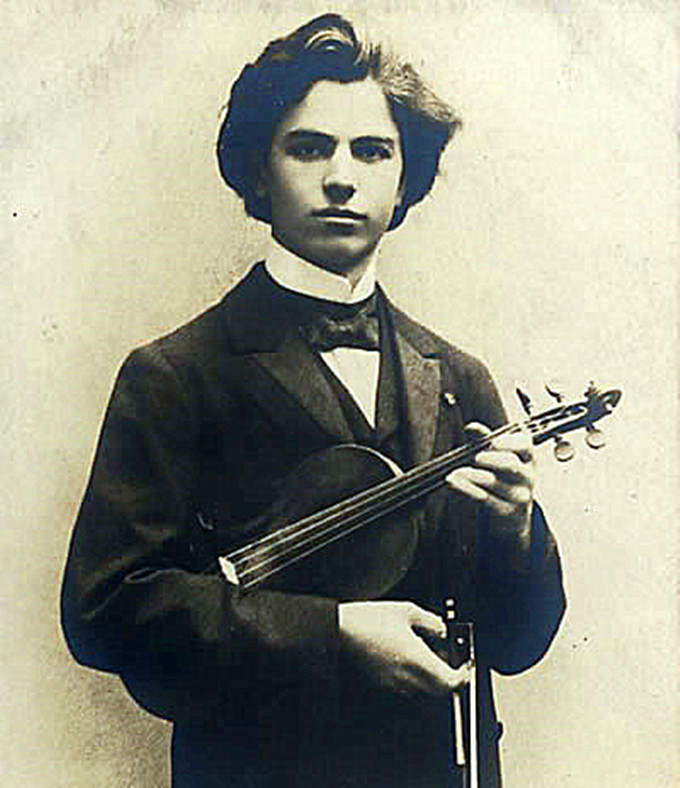 |
|
|
|
| |
扬·库贝利克(Jan kubelík) |
|
|
|
| |
扬·库贝利克(Jan kubelík)在1880年7月5日生于布拉格附近的米什列。父母均为捷克人。他五岁开始从父亲学小提琴,父亲以园艺为业,业余从事音乐。库贝利克八岁时在布拉格第一次登台,演奏维厄当的协奏曲和几首维尼亚夫斯基的小曲。后来他从韦贝拉、昂德里奇卡和斯尔斯内学琴,每年换一次老师。真正的老师是他在布拉格音乐学院师事六年之久的奥托卡·舍夫契克(1852-1934)。舍夫契克的学生据说先后数以千计,因为他在欧美各地的教学生涯长得出奇。学生中有埃里卡·莫里尼、埃弗雷姆·津巴利斯特(在奥尔以后),弗朗茨·昂德里切克、雅罗斯拉夫·科齐安,玛丽·霍尔和莱奥诺拉·杰克逊。
舍夫契克以技巧练习著称,这些练习至今仍被广泛采用,他的重点是训练手指和弓子,快速灵活到令人难以置信的地步。而诸如优美的音色、气魄恢宏的风格和精妙入微的细节等,则非他的常用字眼。在他门下最勤奋的学生每天练琴八小时,迫求超人的琴上功夫,用以为没有光彩的向后看的乐曲处理服务。 |
|
|
|
| |
|
|
|
|
| |
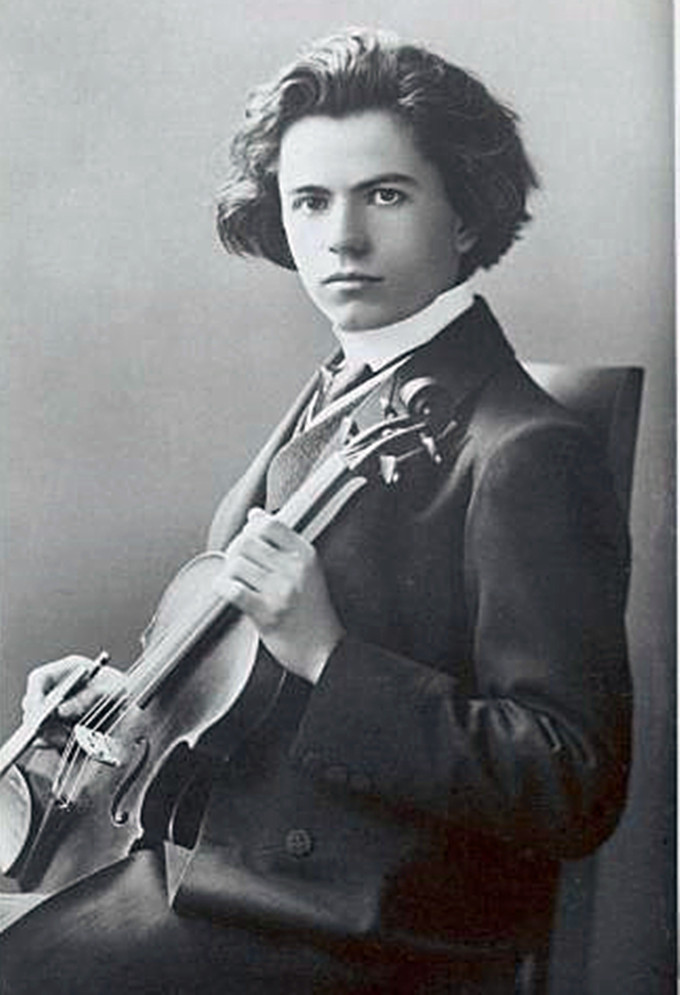 |
|
| |
扬·库贝利克(jan kubelík) |
|
|
|
| |
舍夫契克的得意门生 |
|
|
|
| |
天生具有音乐表现倾向的学生,沉溺在舍夫契克的方法中过久以后,不少人会成为,而且真的成了干巴巴的刻板的机器。库贝利克就是第一号例子。(舍夫契克的方法用得有节制的话,是十分有益的。)然而卡尔·弗莱什一面大骂库贝利克,一面却称他为“…最高级的天才”,蒂博称他为“……真正的天才小提琴家……如能得到别的老师指点,定能成为不朽的艺术家……我把他算在舍夫契克的受害者之列。”蒂博说,这位捷克人在演出贝多芬协奏曲的前一天,“…从早到晚只拉舍夫契克的练习”。甚至在演出的那一天还忍着手指疼痛坚持不断地练。这样的疲劳战当然只会麻木指尖的敏锐感觉、削弱自发的音乐感情。
库贝利克是舍夫契克教学成就的典型例子。十八岁演奏勃拉姆斯的协奏曲时就用自己的华彩段,还拉帕格尼尼第一协奏曲。虽然他的曲目包括当时大多数的热门作品,但他主要靠帕格尼尼一类的音乐出名。前后两年,他的体操式绝技征服了维也纳、布达佩斯、巴黎和伦敦的听众(即使评论家未必全被征服)。这些胜利中还包括一次去意大利的演出,教皇利奥十三世在罗马授予他圣格列哥利勋章。欧洲各国君王也纷纷赐以荣誉和勋章。 |
|
|
|
| |
|
|
|
|
| |
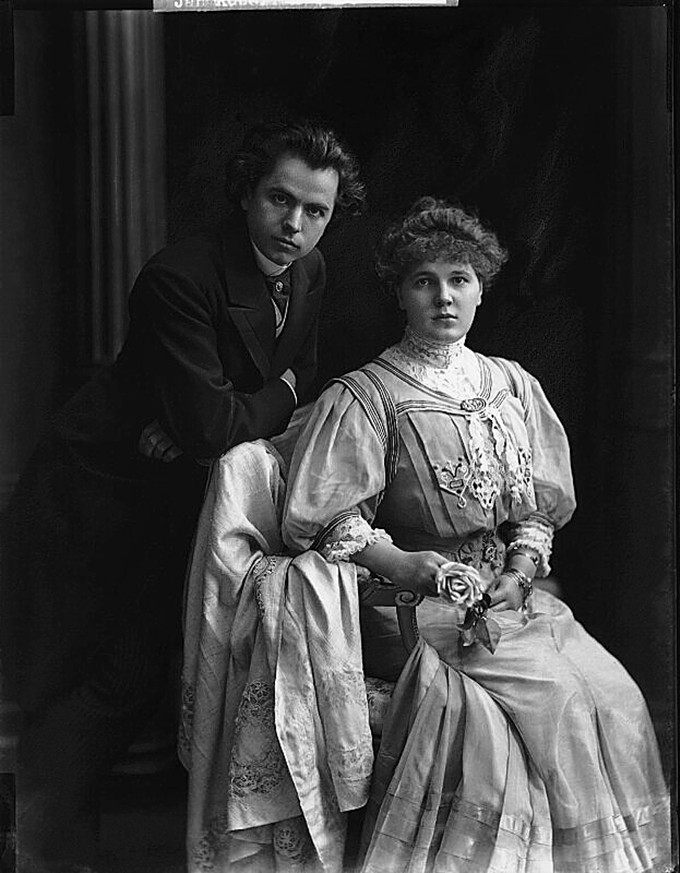 |
|
| |
扬·库贝利克(jan kubelík)和夫人 |
|
|
|
| |
1902年,扬·库贝利克首次访问美国,可谓轰动一时。他被称为“帕格尼尼的继承人”,一如帕格尼尼当年的盛况,店铺橱窗里到处都是“库贝利克式”的鞋、帽、围巾和其他用品。音乐会卖座率一度超过芝加哥的帕德雷夫斯基。社交场中的姑娘们竞相向他求婚。不出几年,一次次访美演出的收入达五十余万美元,这在当时可是一笔巨款(克莱斯勒在1905年与纽约爱乐乐团合作演出两场音乐会,收入才四百美元!)。
库贝利克前几次访美演出的钢琴伴奏是鲁道夫·弗里姆尔,即后来以创作可爱的轻歌剧闻名的弗里姆尔。
当然,胜利不是绝对的。德国的音乐标准比较保守严肃,对于库贝利克的声誉反应冷淡。美国著名评论家亨利·芬克在1909年写的文章中对这位捷克人的演奏明确表示失望。他把帕格尼尼的协奏曲比作罗西尼和多尼采蒂的歌剧,不失公允,但是说这些协奏曲是“老古董……只有装饰繁褥的风格”,未免过于主观。芬克的音乐趣味显然同古典主义意大利歌剧的魔力不一致。
1903年,扬·库贝利克和匈牙利的扎基·塞尔伯爵夫人结婚,成为匈牙利公民,生有五子三女,其中一个为当代著名指挥拉斐尔·库贝利克。1915年,库贝利克退出音乐会舞台,悉心作曲,作品有六首小提琴协奏曲、许多小曲、改编曲、华采段和一首交响曲,现在这些乐曲都没有人演奏了。1921年他重返舞台,但已不再能唤起世纪初那个天真时期的热烈反应。库贝利克于1940年12月5日卒于布拉格。 |
|
|
|
| |
 |
|
| |
扬·库贝利克(jan kubelík)在美国 |
|
|
|
| |
In 1902,
Kubellick made his first sensational visit to the United
States.He was called "The Heir of Paganini," and, as paganini
once did, the shop Windows were filled with "Kubellick" shoes,
hats, scarves and other items.For a time, the concert sold out
faster than Paderewski in Chicago.The girls at the party vied
with each other to propose to him.Within a few years, visits to
the United States brought in more than half a million dollars,
which was a lot of money at the time. (In 1905, Chrysler made
400 dollars for two concerts with the New York Philharmonic!).
The piano accompanist on kubellick's first visits to the United
States was Rudolf Frimle, later known for his lovely operetta.
Of course, victory is not absolute.German musical standards are
conservative and austere, and Kubelic's reputation has been
lukewarm.In an article written in 1909, Henry Fink, a famous
American critic, expressed his unequivocal disappointment with
the Czech's performance.He justly likened paganini's concertos
to those of Rossini and Donizetti, but said they were "old
fogies...Only the style of decoration is too subjective.Fink's
musical tastes are clearly at odds with the magic of classical
Italian opera.
In 1903, Kubelic married countess Zaki Sel of Hungary and became
a Hungarian citizen. They had five sons and three daughters, one
of whom was the famous contemporary conductor Raphael Kubelic.In
1915, Kubellick retired from the concert stage to concentrate on
his compositions of six violin concertos, many ditties,
arrangements, melodies and a symphony that are now unplayed.His
return to the stage in 1921 no longer evokes the enthusiastic
reaction of the naive early years of the century.Kubelic died in
Prague on December 5, 1940. |
|
|
|
| |
 |
|
| |
扬·库贝利克(jan kubelík)后来赢得“捷克的帕格尼尼”美誉 |
|
|
|
| |
Jan Kubelík later won the reputation of "the Paganini of the Czech
Republic". |
|
|
|
| |
 |
|
|
|
| |
扬·库贝利克(jan kubelík)的1715年斯特拉迪瓦里的价值连城的小提琴“皇帝” |
|
|
|
| |
jan kubelik's 1715
Stradivari's priceless violin "Emperor" |
|
|
|
| |
Jan
Kubelík演奏了一把瓜纳里小提琴Gesù,还拥有两把斯特拉迪瓦里小提琴,其中一把是世界著名的1715年斯特拉迪瓦里皇帝。1910年圣诞节,Jan
Kubelík买了一件无价的乐器——著名的斯特拉迪瓦里小提琴皇帝,从1715年开始。 |
|
|
|
| |
Kubelík played a
Guarneri del Gesù violin and also owned two Stradivarius violins, one
being the world famous 1715 Stradivarius Emperor. On Christmas of 1910,
Jan Kubelík bought the priceless musical instrument – the famous
Stradivarius violin Emperor from 1715. |
|
|
|
| |
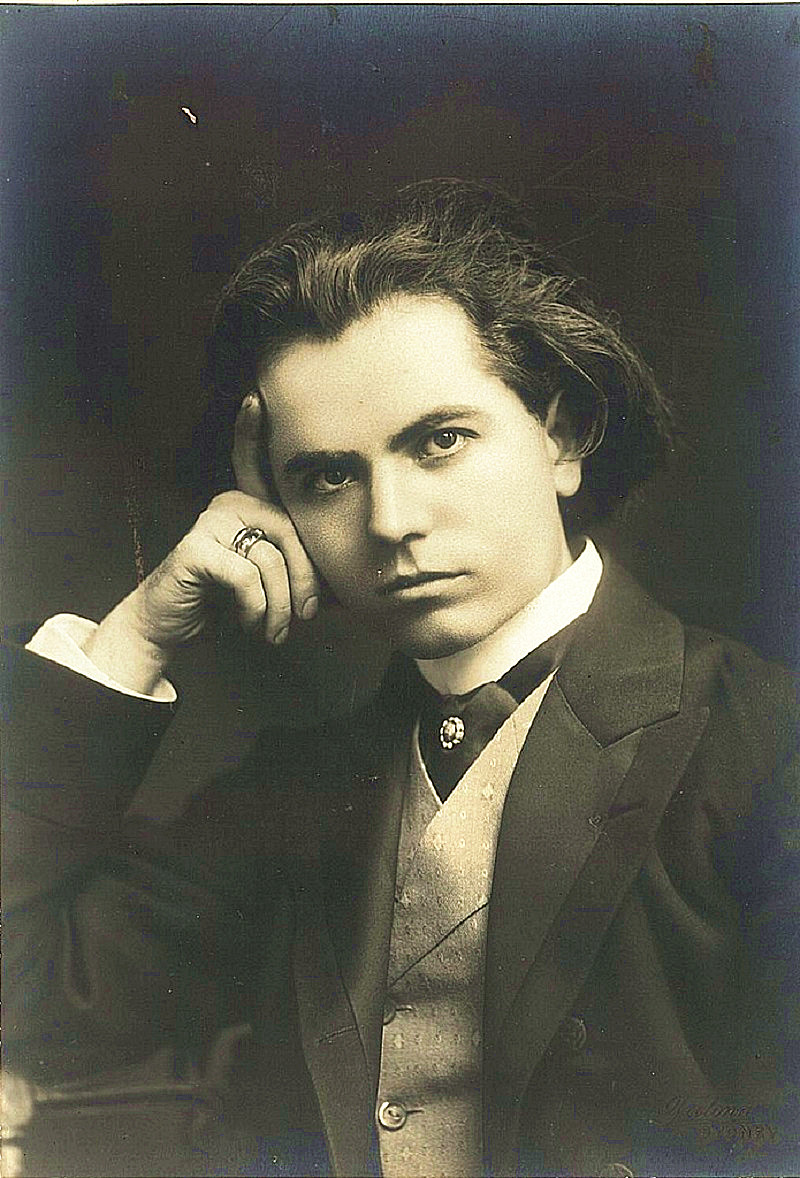 |
|
|
|
| |
捷克的帕格尼尼”扬·库贝利克(jan kubelík)在思考中 |
|
|
|
| |
Jan Kubelík later won the reputation of "the Paganini of the Czech
Republic". |
|
|
|
| |
|
|
|
|
| |
|
|
|
|
| |
[拉斐尔·库贝利克 BRSO 马五]Symphony No. 5 (Mahler)
- Rafael Kubelik,
BRSO
|
|
|
|
| |
|
|
|
|
| |
|
|
|
|
| |
唯二现场录音&父子合作! Jan
Kubelík 演奏 帕格尼尼 钟 小提琴协奏曲
1935卡内基大厅录音
|
|
|
|
| |
Live 1935.3.31 结尾录音遗失 Jan
Kubelík(1880-1940)是和Jaroslav
Kocián齐名的捷克小提琴天才。他向Otakar
Ševčík学艺,娶了前匈牙利总理的女儿,他们的儿子之一就是著名的指挥家Rafael
Kubelík。他的录音挺多的,但据我所知这是唯一一个现场录音。 |
|
|
|
| |
|
|
|
|
| |
未得原作者编者授权严禁转载www.mt77.com任何内容 |
|
|
|
|
|
|
|
|
|
|
|
|
|
|


